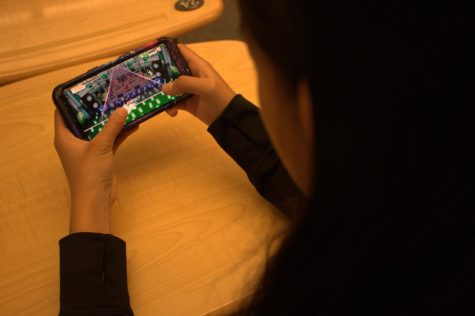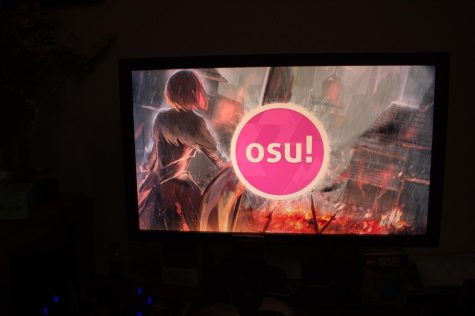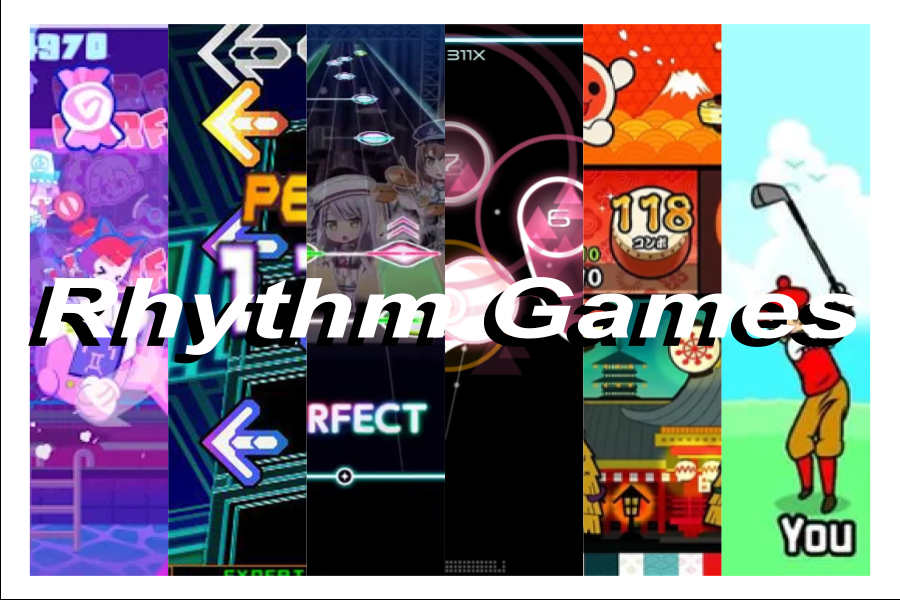A Niche Genre Revolutionizes the Video Game Industry
(Collage by Austin Jew; Photos licensed under CC BY-NC-SA 3.0).
A collage of various different rhythm games lists from left to right “Muse Dash,” “Dance Dance Revolution,” “Bang Dream! Girls Band Party,” “Osu! Laser,” “Taiko no Tatsujin” and “Rhythm Heaven Fever.” Rhythm games have been around since 1996 and see some popularity in certain parts of the video game community.
The video game industry is a crucial part of the entertainment economy with an estimated $97.67 billion accumulated in 2022 nationally. The music and rhythm game category, however, have been viewed as a more niche section that profits only a small portion in the video game market.
Rhythm games have been around since 1996, with the genre’s first game “PaRappa the Rapper” soon evolving into a range of games, from “Dance Dance Revolution” (“DDR”) and “Guitar Hero” to games today such as “Beat Saber” and “Osu!” The basics involve simple movements such as hitting, clicking or stepping on a note to the beat of tune, alongside other mechanics to differentiate the game from the many others.

Players may be asking themselves why they should play rhythm games or care about the subject matter. Various studies reported by STL Rock School and Japan Forward have shown that rhythm games can provide benefits such as training the mind with pattern recognition, an increase of focus, hand-eye coordination, stress relief and simulating hearing senses over visual senses.
Musician and Sage Creek junior Makoto Kaburagi compares his “before and after” experience with rhythm games.
“Playing rhythm games has definitely improved my reflexes and hand-eye coordination,” Kaburagi said. “Exposing myself to harder and faster songs in the games heavily improves my real-life reflexes too.”
Rhythm games as a tool to assist music playing is also available. Many musicians may look at rhythm games, and although may have not played them, acknowledge their advantages.
Nancie Huang-Ball, a former Sage Creek student and advanced pianist who has been playing the instrument for 13 years, describes her outside perspective on rhythm games.
“As someone who doesn’t really play rhythm games, I just see them as good mind exercises,” Huang-Ball said. “I mean it’s just one of those things that kind of gets you thinking and it keeps you on your feet so you’re able to react quickly, critical think and problem solve so it can help you.”
These games, however, don’t have the most technologically advanced graphics or animations and instead prioritize the music and beat maps themselves. From an outside perspective, the games may also look fairly intense or require a perception of musicality which often deters new players. This means many of the benefits the games bring may be overlooked due to how uninviting they may seem at first glance.
Non-musician and rhythm game player Johanssen Santiago Koegler describes why he believes people don’t play rhythm games.

“They think it is too hard for them to try to play any rhythm games or that they don’t want to be associated with the community since rhythm games tend to be connected to anime and not in a good way,” Koegler said.
Alongside the downsides of rhythm games as a genre, there also appears to be another concern with playing rhythm games or getting that first start. Many public rhythm games may only be in arcades or cost money. The accessibility as well as the ability to find the perfect rhythm game may be a difficulty.
“I didn’t really know what rhythm games were apart from piano tiles, and I don’t think it’s distributed enough, and people aren’t aware that they exist or if they’re good,” Huang-Ball said.
Despite there being people who overlook the genre, there is still a dedicated fanbase for this game style with many people still playing on a regular basis. There also have been many new outlets for players to be introduced to the category of the game such as a variety of free mobile games such as “Arcaea,” “Cytus” and “Project SEKAI COLORFUL STAGE!,” all containing aspects from hardcore rhythm games such as “Osu!” and taking away the factor of price.
“I really enjoy playing rhythm games since it’s satisfying to hit to the beat of your favorite, and it’s just overall fun to play,” Koegler said.
Now one may be wondering if rhythm games can assist in playing a musical instrument. Many research and sources like the National Library of Medicine, Louisiana State University and the University of Nevada Las Vegas document different results on how helpful they may be.

However, to musicians and students alike, the general consensus is that rhythm games are mutually beneficial.
“Playing rhythm games has definitely improved my sense of rhythm and timing,” Kaburagi said. “I used to struggle with timing, but since I’ve started playing, I’ve gotten noticeably better.”
Koegler mentioned his experiences as a non-musician in light of gaming.
“It helped with my memory skills since it’s a requirement to memorize a map in order to improve your score,” Koegler said. “Decision-making skills also improve since you are staring at a map since you are going in blind and are purely relying on your sight reading skills or decision-making skills.”
Through and through, rhythm games will never be a true replacement for the performance of music through an instrument let alone provide full practice.
“I don’t think it can really beat musical techniques like practicing scales and your arpeggios and grammatics,” Huang-Ball said. “But they’re definitely not going to hinder your performance.”
Although rhythm games have been considered a niche category in the video game world, they provide a unique experience that distances themselves from most games. If someone wants to try something new to relax or simply have fun, rhythm games may be their best option.
Let the music be the guide as players embark on a captivating journey through these games that have stolen countless hearts. Players may have a fun, eventful and rhythmic experience if they are willing to give it a chance.



Austin Jew ◊ Jun 7, 2023 at 11:40 am
The One Piece is Real
William Lee ◊ Jun 7, 2023 at 11:45 am
“Oh can we get much higher?”
“so high”
“harr harr harr”
“harr harr harr”
John Rhythm ◊ Jun 6, 2023 at 8:35 am
Very accurate and eye-catching article, the rhythm community would be proud! Great Job Austin Jew!